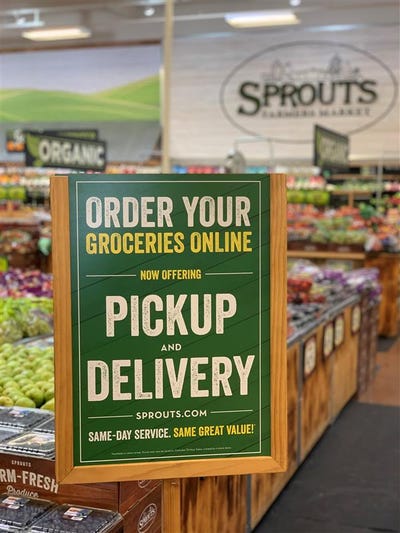Sprouts Farmers Market Q1 earnings leap over Wall Street’s forecastSprouts Farmers Market Q1 earnings leap over Wall Street’s forecast
Grocery industry ‘experiencing a significant change in consumer behavior,’ CEO Jack Sinclair says
May 6, 2020

Sprouts Farmers Market beat Wall Street’s earnings-per-share projection by 25 cents for the fiscal 2020 first quarter, as consumer demand spurred by the COVID-19 outbreak hoisted net and same-store sales by double digits.
For the quarter ended March 29, net sales climbed 16.1% to $1.65 billion from $1.41 billion a year earlier, Sprouts reported yesterday after the market close. The Phoenix-based specialty grocer attributed the hefty gain to a 10.6% increase in comparable-store sales and a strong performance by newly opened stores.
Sprouts said customer demand spiked in the latter part of the quarter as the coronavirus crisis escalated. The company estimated the quarterly sales lift from the pandemic at $146 million, with comp-store sales sales hiked by 9.6% and adjusted EPS by 22 cents.
According to Chief Financial Officer Denise Paulonis, the first quarter began with January and February comp sales on track to post at the high end of Sprouts’ outlook with slightly negative traffic.
“Starting in March, consumer behavior dramatically changed, as customers began to fill their pantries as COVID-19 stay-at-home orders led to less eating out,” Paulonis said late Tuesday in a conference call with analysts. “We experienced heightened comps in the middle of March, led by grocery, frozen and vitamin categories, which settled by month-end due to higher new normal, resulting in a 26% comp for the month of March. Sales were up in the store, as well as through our digital home delivery and pickup.”

The elevated sales have continued into April, but not at the same level as in March, CEO Jack Sinclair (left) said in the call. April same-store sales rose 7.2% year over year, even with all stores closed on Easter Sunday, and the average basket size $51, nearly double the historic average, Paulonis noted.
“We believe the stockpiling is over. More importantly, our observation is the industry is experiencing a significant change in consumer behavior,” Sinclair explained. “In order to avoid social contact, customers are consolidating their shopping trips and shifting their visits more throughout the week and less on the weekend. The less trips are resulting in many more items in the baskets but at a reduction to traffic. No one knows how long these behaviors will last.”
E-commerce accounted for 4% of first-quarter net sales, up more than 160% from a year ago. The trend has stretched into April, as e-commerce sales represented 13% of sales for the month. Sinclair attributed the online sales jump to changed consumer behavior from social distancing.
“For April, our e-commerce sales increased over 950% from last year. This change in consumer preference prompted us to swiftly roll out our pickup service from 55 stores to all stores. We aggressively implemented the service to Los Angeles and Central California in mid-April and are on target to implement at all 344 stores in early May,” he said.

“This service, in partnership with Instacart, utilizes an innovative model, with our team members performing the picking and delivery to cars. Many of these pickup roles will be filled with existing team members, which has presented even more opportunity for us to bring in new talent,” Sinclair added. “Throughout COVID-19, we have been aggressively hiring, creating thousands of new careers at Sprouts. Though it is much too early to define a new normal, COVID-19 has been a catalyst for trial of our e-commerce offerings, which could stick with many customers as we exit this pandemic.”
Right: Online sales accounted for 4% of first-quarter net sales, up more than 160% from a year ago, according to Sprouts.
At the bottom line, first-quarter net income for the quarter was $91.8 million, or 78 cents per diluted share, compared with $56.4 million, or 46 cents per diluted share, a year ago. Excluding costs from strategic initiatives and store relocations and closures, adjusted net earnings were $92.7 million, or 79 cents per diluted share, versus $56.8 million or 46 cents per diluted share, in the fiscal 2019 quarter.
Analysts, on average, had projected Sprouts’ first-quarter adjusted EPS at 54 cents, with estimates ranging from a low of 46 cents to a high of 60 cents, according to Refinitiv/Thomson Reuters.
Sprouts spent $17 million on capital expenditures in the quarter, mainly for new stores. The retailer opened four new stores, ending the period with 344 stores in 23 states.
“We remain on track to open approximately 20 new stores this year,” Paulonis said. “So far, only one store has been delayed due to the COVID-19 pandemic.”
Sinclair noted that new stores, which feature Sprouts’ latest format, are showing strong results out of the gate.
“We have discovered that in our newest 2019 vintage, we have seen an outsized lift in sales compared to the chain average. It’s too early to tell, but perhaps the maturity curve for these stores is being accelerated as new customers are experiencing Sprouts for the first time,” he said in the call. “Anecdotally, we’ve heard from many customers in our new markets that it was their first visit into our store, as they were unaware of us before the crisis. The changing dynamics during this health crisis have prompted consumers to opt for healthier food, resulting in a mix increase to more organic sales and produce and more grass-fed beef and more antibiotic-free chicken.”
Because of significant investments in pay, benefits and safety measures during the pandemic, as well as shifting shopper habits, Sprouts isn’t providing guidance for the full year.
“The COVID-19 crisis has created a lack of visibility for the remainder of 2020, with many unknowns. We remain uncertain as to when the consumer behavior will return to normal or what may emerge as the new normal,” Paulonis said. “This environment is making it difficult to predict specific outcomes and, accordingly, we are not reaffirming or stating a new outlook range. However, due to the strong sales and earnings to date, we currently expect that we will be able to meet or exceed our previously released annual outlook.”
When reporting fiscal 2019 results in February, Sprouts forecast fiscal 2020 net sales growth of 5.5% to 6.5%, with comp sales flat to up 1%. Adjusted EPS was projected at $1.17 to $1.23, while capital spending was estimated at $120 million to $130 million.
Analysts’ consensus estimate for fiscal 2020 adjusted EPS of $1.39, with projections running from $1.28 to $1.60, according to Refinitiv/Thomson Reuters.
Sprouts turned in an “impressive” first quarter, as the company is seeing its enhanced promotional strategy paying off but still awaits a turnaround in store traffic turnaround, according to Jefferies analyst Christopher Mandeville.
“Management is proving effective at pivoting its promo strategy to one that emphasizes differentiation rather than lowest price, as gross margin percentages are now up more than 100 basis points for two consecutive quarters. And we expect fairly similar gains until the introduction of the program is lapped in 4Q20,” Mandeville wrote in a research note on Tuesday.
“While expansion is greater than expected, the company’s ultimate goal is to flip traffic back to positive territory, which unfortunately hasn’t happened yet,” he said. “As COVID benefits abate and online becomes more prominent, we believe better traffic might prove tough to come by near term.”
For our most up-to-date coverage, visit the coronavirus homepage.
Read more about:
Sprouts Farmers MarketAbout the Author
You May Also Like





.webp?width=300&auto=webp&quality=80&disable=upscale)
